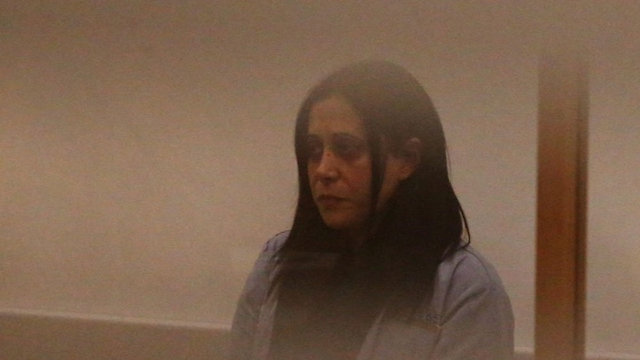
Who will released prisoner Eti Alon put in danger?
Photo: Atta Awisat
Here's a story of a woman who was sentenced to a prison term following a fatal road accident. Her husband telephoned me over the weekend. His wife, he said, got to know Eti Alon, the woman who stole millions of shekels from the Trade Bank while working there, at the Neve Tirza women's prison.
I don’t know Eti Alon. I read about her misdeeds in the newspaper during her trial. Like every other reader, I found it difficult to digest the extent of the theft. A State Prosecutor's Office document said the stolen sum had reached a quarter of a billion shekels, and that the damage suffered by the state was estimated at half a billion shekels.

She couldn't understand why the State Prosecutor's Office was appealing the decision to release her after she served more than two-thirds of her jail term. Why the judges, who sentenced Alon to 17 years in prison, knew that the sentence could be cut by one-third for good behavior. Why are they treating her with so much malice?
Double Standards?
Nahum Barnea
Op-ed: Request to postpone trial involving former caretaker at prime minister's residence has nothing to do with elections or legal proceedings; it has to do with one woman: Sara Netanyahu.
"These are astronomic sums," ruled the two advocates who signed the paper. I believe they are right: There have been many thieves in Israel, before and after Eti Alon, we have had plenty of embezzlers, inside and outside the banks, but Alon surpassed them all.
She was caught, convicted and punished. A year and a half ago, she completed two-thirds of her prison sentence. She turned to the parole board, but was met with strong opposition from the State Prosecutor's Office. The parole board denied her request for several reasons. The main argument was that she did not fulfill her duties as a prisoner in a rehabilitation process.
She completed the required duties and asked the parole board to review her case again. Judge Shlomo Shoham heard both sides' arguments and decided to release her under restrictions. The State Prosecutor's Office is now appealing his decision.

Eti Alon in court. Are the distinguished prosecutors driven by the public interest or by the big thief's famous name? (Photo: Moti Kimchi)
The arguments of the State Prosecutor's Office stretch over 36 pages. Like many other legal documents, they are filled with relevant and irrelevant argumentations. The important thing is to fill the paper with words.
The basic argument presented by the State Prosecutor's Office is that under special circumstances, it is permitted by law to prevent a prisoner's release for good behavior after he completed two-third of his sentence.
There are precedents, the State Prosecutor's Office says: Nahum Manbar, who committed serious security-related offenses in his business dealings with Iran; and Ofer Gamliel and Shlomi Dvir from the Bat Ayin underground, terrorists who tried to commit a mass murder in a school.
In both cases, there was a clear element of danger to the public. Manbar and his secrets, Gamliel and Dvir and their schemes. Who will released prisoner Eti Alon put in danger? Is there a single bank which will offer her job? Is there any cash register, even in the supermarket, which she will be given access to?
Nevertheless, the State Prosecutor's Office claims she is dangerous, without explaining why. (By the way, both Manbar and the Bat Ayin terrorists were released before the end of their prison term. Instead of by one-third, their sentence was cut by one-quarter or one-fifth. In terms of the danger to the public, it was insignificant).
In addition to "special circumstances," the clause (10a) which makes it possible to prevent an inmate's release mentions two other arguments: Serious damage to the public's trust in the legal system and to deterring criminals; and an unreasonable proportion between the severity of the act and the punishment.
Is a release after 13 years in prison an easy punishment which requires an adjustment? I don’t think so. There are criminals in Israel who sat in prison for a much shorter period of time. There are heavy drug dealers in Israel who spent much less time in prison.
Will the release cause serious damage to the legal system? The opposite appears to be true. Cutting a sentence by one-third aims to instill hope in inmates' hearts, to encourage them to rehabilitate themselves, to restrain their behavior in prison, to prevent them from trying to escape. The legal system will not be rewarded for undermining prisoners' trust in the existence of the good conduct time.
The State Prosecutor's Office is a powerful institution. Power is destructive, wiser people have said. Power does something else: It lures those in possession of it to malice, evil, pure aggression.
The State Prosecutor's Office's job is to pursue today's thieves, not those who have already been caught and convicted and have paid their debt to society.
Eti Alon is a celebrity, a thief who made and still makes headlines. The distinguished prosecutors should put their hand on their heart and swear that they are only driven by the public interest and not, incidentally, by the famous name of the big thief from the Trade Bank.
















